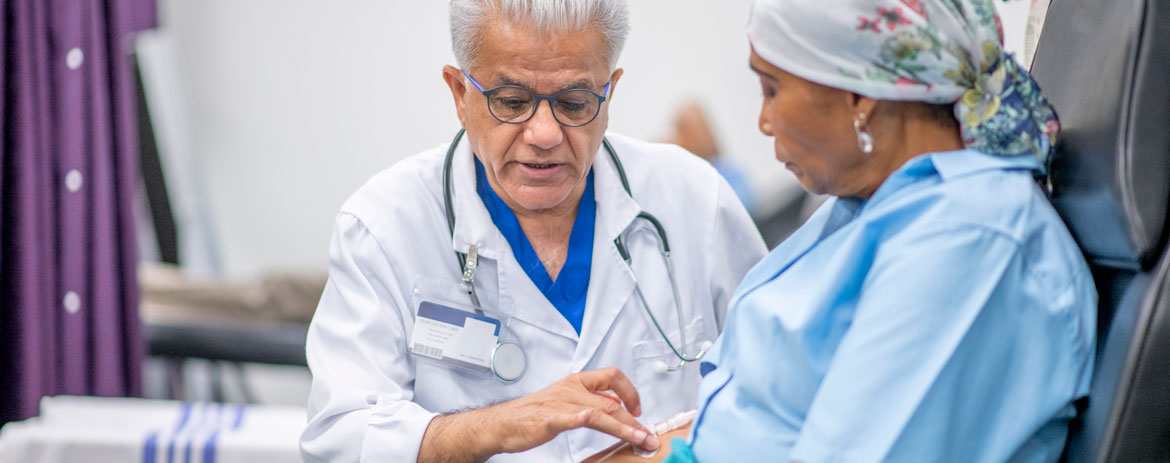
In the 30-plus years that Dr. Nicholas Robert has been involved in breast cancer research, he has seen remarkable progress, with plenty of encouraging treatment developments on the near horizon. To mark Breast Cancer Awareness Month, we asked Dr. Robert, who was also a co-chair of the Breast Committee at US Oncology Research, about the evolution of breast cancer treatment.
Q: How has breast cancer treatment evolved in recent years?
A: We have a deeper understanding of the genomics of breast cancer. This in-depth understanding lets us distinguish different subsets of breast cancer, which translates into more specific and sophisticated types of treatments.
Q: What are some promising breast cancer treatments?
A: A couple promising treatments are for managing metastatic breast cancer, such as drugs that target subsets of breast cancer like BRCA positive (breast cancer gene) cancers. These drugs don’t work for all breast cancers. However, for the patients with the BRCA mutation that matches with the drug, their disease can be managed long-term, like managing a chronic illness. In this case, this type of drug is in pill form rather than IV, so it’s more easily administered. The pill is not as harsh on the body, which allows for a better quality of life.
Another treatment has been the development of CDK (cyclin-dependent kinase) inhibitors. These drugs have exhibited long term control of the growth of cancer cells. Like the BRCA treatment, this treatment is in pill form. Although not curative, these drugs are making breast cancer more of a managed chronic condition.
Q: What do you believe the future of breast cancer research and treatment holds?
A: As we better understand the different types of breast cancer on a molecular level, we have opportunities to treat those tumors more specifically to their molecular profile. This can offer a better treatment plan for those in the metastatic stages, which may prolong life.
Being able to prolong life for patients with metastatic breast cancer is very encouraging. As we continue to learn about the molecular drivers of specific types of breast cancer, we’ll be able to create and offer drugs that allow for the long-term management of chronic metastatic cancer without disrupting the patient’s quality of life —somewhat like how HIV is treated today. Patients receiving HIV treatment can have their disease under control for years.
Q: What role do retrospective studies play in advancing breast cancer research?
A: A randomized controlled clinical trial has eligibility restrictions and takes place over a limited time, so it gives you just a slice of how a treatment works. With retrospective studies, we get real-world data (RWD) from patients with a wider number of variables over a longer period. We can juxtapose the observational data with the randomized trial data to get a fuller picture of how a certain therapy is working for patients. For example, we can see if any adverse events pop up after a drug has been approved. Having that knowledge can lead to treatment plans that may improve patient care.
From my perspective, coming from a background of traditional clinical trials, using RWD is an exciting opportunity to improve the lives of patients with breast cancer—and all other cancers, too. The Ontada team and I are motivated by one thing: improving patient care. As I said, retrospective studies present an opportunity to take real-world information—to see how an approved treatment is working or not working—for a wider variety of patients than are in a clinical trial.
Retrospective studies also can be used to study investigative treatments for small subsets of patients. Because there are not enough patients in these subsets, the traditional approach of doing a randomized clinical trial may not be an option. However, studies for these smaller groups of patients can be done by comparing an investigative treatment with the real-world data from standard treatment. The team at Ontada has the potential to provide such data so that conclusions are reliable and actionable. This is exciting. It allows us the opportunity to help more cancer patients, which, at the end of the day, is what motivates all of us.
Q: How can people reduce their risk of getting breast cancer, and why is preventive care important?
A: Aside from getting regular screenings and following the lifestyle and dietary recommendations, it’s important to know if there is family history of breast cancer. If so, genetic counseling should be considered. We have a much better understanding of genetic risk than in the past. If someone knows they have a positive family history for cancer, they can talk to their primary care doctor about the value of genetic counseling and if it is needed to minimize risk.
Reference resources: Interview with Dr. Robert and
https://www.breastcancer.org/about_us/pab/nicholas_robert
https://side-out.org/foundation-news/dr-robert-invited-to-serve-on-ascos-cancer-research-committee/
https://www.linkedin.com/in/nicholas-robert-1a681617/
https://en.wikipedia.org/wiki/Olaparib
https://en.wikipedia.org/wiki/CDK_inhibitor



